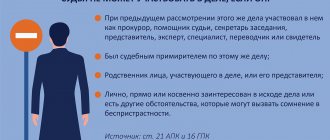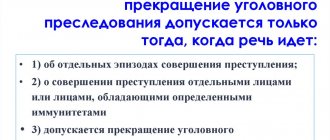Any participant in the case during its consideration may file an application to challenge the prosecutor. By virtue of the law, the prosecutor must independently file an application for recusal if there are grounds for it. But circumstances may turn out differently. If the participation of the appointed prosecutor, in the opinion of the person involved in the case, may violate the objectivity of the process, it is the application for the recusal of the prosecutor that will be the correctly chosen reaction and method.
In the Code of Civil Procedure, Chapter 2 is devoted to challenges to persons participating in the case. The grounds for challenge are the same for any participant in the case. And there are no special exceptions or grounds for disqualifying a prosecutor.
Sometimes the participation of the prosecutor is mandatory (for example, in cases of adoption, deprivation of parental rights), sometimes he can be involved as a third party. Sometimes the prosecutor is invited to the trial in cases where his participation is not established by law.
The challenge of a prosecutor is possible only in cases of his mandatory participation in the case (Article 45 of the Code of Civil Procedure of the Russian Federation). If the prosecutor's office or the prosecutor are involved as third parties, an application for the exclusion of the third party must be submitted to the court. And if he is the defendant - an application to replace the defendant (but then we are talking about the exclusion of the prosecutor's office as an authority, and not a specific prosecutor).
:
Application for recusal of the prosecutor
How to prepare an application to challenge a prosecutor
In order to replace the prosecutor, it is necessary to have the established Art. 18 Code of Civil Procedure of the Russian Federation grounds. In principle, they coincide with the grounds for filing an application to challenge a judge:
- the prosecutor is a close relative, blood relative or is related to one of the persons participating in the case (plaintiff, defendant, third party, etc.). In this case, the evidence may be official documents, if the party making such a request has them.
- Previously, the prosecutor participated in the case in a different procedural capacity (interpreter, witness, secretary, expert, etc.). Naturally, if he participated as a prosecutor, this is not a basis for his recusal.
- the prosecutor has a personal or indirect interest in the case, which is proven in each case individually.
- He previously acted as a judicial conciliator (he is a retired judge).
Other circumstances, including an unmotivated statement, will not become a basis for disqualifying the prosecutor. Therefore, the applicant must pay special attention to the evidence base and prepare it especially carefully. The reference to the fact that in the process the prosecutor supports the position of the government body that is the Defendant is untenable. The Prosecutor's Office of the Russian Federation always represents the interests of the state.
Comments on Article 66
Based on Art. 66 of the Code of Criminal Procedure, the removal of the prosecutor’s side has two important features:
- An order that an employee be removed from a criminal case under consideration within the framework of both judicial and pre-trial proceedings has the right to be created only at an order of magnitude higher. Replacement is also possible during the paperwork process, but in this case the judicial authority deals with the matter.
- If the prosecutor's office participates in the stages of judicial proceedings, this is not an obstacle to the employee's participation in production processes in the criminal case under consideration.
In other words, only higher authorities, structures or officials can remove a prosecutor from a case, regardless of what role he plays in the case under consideration.
Among the comments, the following points can be identified:
- The prosecutor is one of the important participants in criminal proceedings, who represents the position and side of the prosecution within the framework of the proceedings. The employee has the authority to prosecute those guilty of a criminal offense on behalf of the state and current legislation. And also the employee can supervise the progress and procedural activities of the subordinate bodies of inquiry and investigation.
- Regardless of the situation, the prosecutor must be impartial and objective, and any evidence that he has any interest in the case under consideration excludes this employee from working on the case.
- All actions that are performed by the prosecutor in those processes and forms and are provided for by the norms of the current legislation, as well as in all those decisions that he makes as part of production activities and within the framework of criminal prosecution, should not and cannot be considered as evidence or facts of his bias work. The performance of these actions is an important production point carried out within the framework of the accusatory function at the stages of court proceedings.
For this reason, even if an official of the prosecutor's office must personally supervise activities, news and procedural work, or personally investigate a criminal case.
This will not be an obstacle to the fact that in the future an authorized employee of the prosecutor’s office will have the right to take part in the consideration and analysis of this case at any stage of the proceedings (this point is regulated by BVS of Russia, 2000, number 6).
Filing an application to challenge a prosecutor
The rights and obligations of persons participating in the case provide the opportunity to submit such a petition to any participant in the process. It is better to prepare an application to challenge the prosecutor in writing. Although it is assumed that it can be stated orally. But the presence of a written document will make it possible in the future, during an appeal, to refer to the participation of the prosecutor if there are circumstances for his recusal.
An application to disqualify the prosecutor must be submitted to the applicant before the judge begins the consideration of the case on the merits. For example, at a preliminary court hearing. Unless the circumstances of the challenge became known already during the consideration of the case, then at any time before the court’s decision.
Grounds for which recusal is possible
An authorized employee does not have the right to participate in the case under consideration and in criminal proceedings if he took part in it, but in a different role.
For example, if previously in the same case he was a victim, witness, witness or other person. Also, an authorized employee of the prosecutor’s office is removed from consideration of the case and actions related to it if he is related to any of the participants in the judicial proceedings.
Among other reasons on the basis of which he will not be allowed to proceed with any offense, the following are highlighted:
- When the official is a plaintiff, witness, victim or defendant.
- If previously an authorized employee of the prosecutor's office took part in both pre-trial and judicial proceedings, but in a different position or in a different role. As an example, as an assessor, witness, translator or other participants.
- He is removed from the case if he is a relative of one of the participants.
This point is the basis for doubting the honesty and objectivity of the prosecutor’s actions in relation to the relative.
Consideration of an application to challenge a prosecutor
An application to disqualify a prosecutor is considered by the judge in charge of the case. The person who filed the relevant application, the prosecutor whose challenge is requested, as well as other persons participating in the process are questioned about the grounds and circumstances of the challenge at the court hearing.
The decision on the application is made in the deliberation room, about which a court ruling is made. It is impossible to file a private complaint against it, so a challenge can only take place by filing an appeal against the court’s decision.
How and in what cases is it possible to remove a prosecutor from a criminal case?
An authorized employee of the prosecutor's office has no right to take either direct or indirect participation in judicial or pre-trial proceedings in a criminal case in the following cases:
- If he is or is a civil plaintiff, injured party or civil defendant in legal proceedings.
- When an authorized employee of the prosecutor's office took part in the same case, but from the side of a specialist, expert, witness, defense lawyer or from some other side.
- Situations or events that cast doubt on the honesty and impartiality of a prosecutor.
If there are one or more reasons for the removal of the prosecutor, he must independently (recuse himself) or through a court decision, remove himself from direct or indirect participation in the case under consideration.
For all of the above reasons, the removal of the prosecutor's side can be initiated by the accused, suspect, defense attorney or any other participants in the trial and pre-trial proceedings. Issues related to the challenge of a prosecutor within the framework of a trial are resolved by the court itself considering the case.
Who can apply
All participants in the process may request the removal of a person until the last stage of the process. In addition, the prosecutor himself is also endowed with this right; according to Article 19 of the Code of Civil Procedure, he can recuse himself if there are certain circumstances.
Participants in the process should file challenges in cases where the participation of the appointed person may lead to a biased decision and violation of the rights of the parties.
Watch the video. How and why to challenge in court:
What is a tap
The parties to the trial have the right to challenge court participants.
Recusal is the removal of a participant in a trial from participation in a case for reasons provided for by the procedural legislation of the state. An application to disqualify a participant in the process is considered by the judge when considering the main case.
Please note! On this appeal, the court issues a ruling that cannot be appealed. For this reason, in addition to the application, the party to the process must present papers or certificates, or receipts that confirm his arguments.
The procedure for filing a challenge and the process of removing a person from participation in the process is prescribed in the second chapter of the Code of Civil Procedure.
PROSECUTOR EXPLAINS: Participation of the prosecutor in civil proceedings
February 3, 2021
PROSECUTOR EXPLAINS: Participation of the prosecutor in civil proceedings
The goals of the prosecutor's participation in civil proceedings are to protect the rights and freedoms of citizens, an indefinite number of persons, and public entities; strengthening the rule of law; ensuring the rule of law; ensuring the legality of the actions of participants in legal proceedings; ensuring the correctness of court decisions; assistance to the court in the administration of justice.
From paragraph 1 of Article 23 and paragraph 1 of Article 35 of the Law on the Prosecutor's Office it follows that the prosecutor goes to court and participates in the consideration of cases in cases and in the manner provided for by the procedural legislation of the Russian Federation.
Based on Article 34 of the Civil Procedure Code of the Russian Federation (hereinafter referred to as the Civil Procedure Code of the Russian Federation), the prosecutor in civil proceedings is a person participating in the case.
The prosecutor has the right to apply to the court or intervene in the case at any stage of the process if required by the protection of the rights of citizens and the legally protected interests of society or the state (clause 3 of Article 35 of the Law on the Prosecutor's Office).
Thus, the prosecutor in civil proceedings acts in two forms: as a plaintiff when filing a claim (application) and to give an opinion on cases of the mandatory category (reinstatement, eviction, compensation for moral damage and in other cases provided for by law).
It is necessary to dwell on the powers of the prosecutor in civil proceedings when filing a claim (application) in court.
In accordance with Article 45 of the Code of Civil Procedure of the Russian Federation, the prosecutor has the right to apply to the court with a statement in defense of the rights, freedoms and legitimate interests of citizens, an indefinite number of persons or the interests of the Russian Federation, constituent entities of the Russian Federation, and municipalities.
An application in defense of the rights, freedoms and legitimate interests of a citizen can be filed by a prosecutor only if the citizen, due to health reasons, age, incapacity and other valid reasons, cannot go to court himself.
This restriction does not apply to the statement of the prosecutor, the basis for which is the appeal of citizens to him for the protection of violated or contested social rights, freedoms and legitimate interests in the field of labor (official) relations and other relations directly related to them; protection of family, motherhood, paternity and childhood; social protection, including social security; ensuring the right to housing in state and municipal housing stocks; health protection, including medical care; ensuring the right to a favorable environment; education.
It follows from the above that the prosecutor does not in all cases have procedural powers to go to court in the interests of a citizen. Often, based on the results of the prosecutor's audit, there are no legal (material) grounds for filing a complaint with the court.
Meanwhile, the prosecutor who filed the application enjoys all procedural rights and bears all the procedural obligations of the plaintiff, with the exception of the right to conclude a settlement agreement and the obligation to pay court costs.
How to write a document correctly
The plaintiff, the offender and other participants in the court may demand the removal of the prosecutor from participation in the case in 2 ways:
- State the request orally at the hearing.
- Submit a written request with copies of evidence.
An application to remove a person from participation in the process is drawn up as follows:
- In the corner of the sheet is written the name of the body and the name of the judge to whom the case was assigned.
- Next, the applicant’s status in the process and his data are indicated: full name, address and contacts.
- After this there is a description of the case under consideration: number and date of initiation, grounds for appeal, etc.
- Then the arguments that served as the reason for filing such an appeal are described, and references must be made to evidence and legal acts.
- At the very end, one requirement is indicated, the attached papers are listed under it, and a date and signature are placed at the end.
Along with such an appeal, it is necessary to submit papers that support the arguments described in the application.
Can the court refuse
The court may satisfy or deny the request to remove a person.
Applications are usually denied on the following grounds:
- If a party to the proceeding has filed a challenge on grounds not specified in the Procedural Code.
- If the applicant has not substantiated his arguments and provided admissible evidence.
Thus, the litigant should pay special attention to the evidence base, since in the absence of evidence the court will refuse to satisfy the stated requirements.





